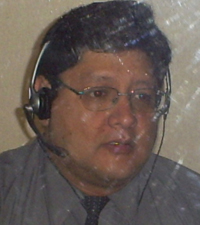shorthand...why not use it in consecutive interpreting? Thread poster: Cao Mac
|
|---|
Cao Mac
Local time: 15:45
English to Spanish
+ ...
Hi all,
My question is really simple. I have read interpreters don't usually use shorthand for their consecutive jobs, WHY NOT?
Thank you all in advance.
| | | | Jane Lamb-Ruiz (X) 
French to English
+ ...
| no shorthand unless you know it | Nov 4, 2003 |
The reason is it would involve learning another langugage 1, and 2, translating from that.
Now,if you ALREADY know shorthand, you could use it but if you don't you are upping the variables. When you read your shorthand back to yourself,you are in effect translating. So it would be double the work.
That's why.
| | | | Magda Dziadosz 
Poland
Local time: 21:45
Member (2004)
English to Polish
+ ...
| Too many things to do.. | Nov 4, 2003 |
at the same time, I guess.
If I make any notes during consecutive interpreting, I scribble figures only, if there are many of them and if they are somehow confusing figures (things like '186 thousands cars produced in 1995 and 195 thousands produced in 1999', etc). Otherwise, writing distracts me enormously. I need to listen, memorise and 'process' at the same time, I guess my 'processor' is too slow to take yet anoth... See more at the same time, I guess.
If I make any notes during consecutive interpreting, I scribble figures only, if there are many of them and if they are somehow confusing figures (things like '186 thousands cars produced in 1995 and 195 thousands produced in 1999', etc). Otherwise, writing distracts me enormously. I need to listen, memorise and 'process' at the same time, I guess my 'processor' is too slow to take yet another task
Also, I notice that when reading form notes, the voice and speach becomes somehow unnatural and looses flow. Frequently emphasis given by the (source) speaker is replaced by the interpreter's emphasis, and this should be avoided.
These are my very quick comments, I would like to hear the experience of other colleagues?
Magda ▲ Collapse
| | | | Antonella Andreella (X) 
Italy
Local time: 21:45
German to Italian
+ ...
| Ideas vs words | Nov 4, 2003 |
Because in consecutive interpreting you need to write down ideas, key concepts and not words which may be just confusing when you translate the speech in another language. In brief you need symbols and key words which help you link the various parts of a speech, like a chain.

Antonella
PS: the risk is that you look after words and miss the 'key' words
[Edited at 2003-11-04 23:46]
| | |
|
|
|
| You use a kind of shorthand | Nov 4, 2003 |
When you take notes, instead of: "In 2003 the car output was 2 million in Detroit",
you write something like "3-car-2m-det". It's a lot clearer than shorthand.
| | | | Clarisa Moraña 
United States
Local time: 14:45
Member (2002)
English to Spanish
+ ...
| Because you are translating ideas, not words | Nov 5, 2003 |
That's the first lesson taught at any interpretation course: you translate ideas, not words. Shorthand is about words, not ideas. If you take notes, you are using concepts, that's why note-taking is so important.
There is an interesting article about it at http://dzibanche.biblos.uqroo.mx/cursos_linea2/azanier/trad_iv_u2.htm#1
Regards,
... See more That's the first lesson taught at any interpretation course: you translate ideas, not words. Shorthand is about words, not ideas. If you take notes, you are using concepts, that's why note-taking is so important.
There is an interesting article about it at http://dzibanche.biblos.uqroo.mx/cursos_linea2/azanier/trad_iv_u2.htm#1
Regards,
Clarisa Moraña ▲ Collapse
| | | | CMJ_Trans (X)
Local time: 21:45
French to English
+ ...
| I agree with other comments.... | Nov 5, 2003 |
I have worked with people who take notes in shorthand but even they do NOT note every single word. Writing in shorthand tends to distract you from actually listening to and understanding what is being said. I have in fact always found it easiest to take notes in the target language, insofar as I noted words. Mostly, once you get used to the technique, you only tend to note figures, dates, names and other key "signposts" to point you on your way. Apart from anything else, you have to get these ri... See more I have worked with people who take notes in shorthand but even they do NOT note every single word. Writing in shorthand tends to distract you from actually listening to and understanding what is being said. I have in fact always found it easiest to take notes in the target language, insofar as I noted words. Mostly, once you get used to the technique, you only tend to note figures, dates, names and other key "signposts" to point you on your way. Apart from anything else, you have to get these right because people always pick up on them and could lose confidence in you, if you make a slip !
It also helps if you can look at people while you're talking, rather than reading off a piece of paper as you would if you had taken notes in full in shorthand. ▲ Collapse
| | | | | too distracting | Nov 9, 2003 |
in my experience, trying to take notes during an interpreting assignment is just too distracting. Dates, and figures even ehen written down break one's concentration of the matter at hand.
I have never used any sort of notes, and if in the case of figures I lose my train of thought I request a repeat of same.
| | | | To report site rules violations or get help, contact a site moderator: You can also contact site staff by submitting a support request » shorthand...why not use it in consecutive interpreting? | Protemos translation business management system | Create your account in minutes, and start working! 3-month trial for agencies, and free for freelancers!
The system lets you keep client/vendor database, with contacts and rates, manage projects and assign jobs to vendors, issue invoices, track payments, store and manage project files, generate business reports on turnover profit per client/manager etc.
More info » |
| | Trados Business Manager Lite | Create customer quotes and invoices from within Trados Studio
Trados Business Manager Lite helps to simplify and speed up some of the daily tasks, such as invoicing and reporting, associated with running your freelance translation business.
More info » |
|
| | | | X Sign in to your ProZ.com account... | | | | | |







